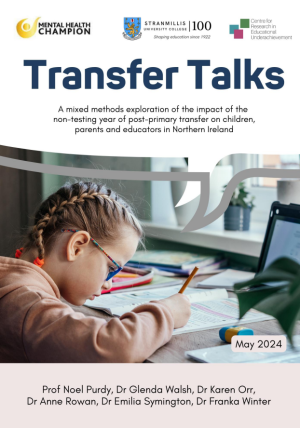
A new research report launched today has highlighted the high levels of stress and anxiety of children (and their parents/carers) who experienced the post-primary transfer procedure in 2020-2021 and calls for a fairer system of post-primary transfer which prioritises the emotional health and wellbeing of all our children irrespective of their background.
The research undertaken by the Centre for Research in Educational Underachievement at Stranmillis University College and funded by the Mental Health Champion for NI, aimed to explore pupils’, parents’/carers’ and teachers’ experiences of the 2020-2021 “non-testing” year of post-primary transfer in Northern Ireland. Admission for this year group to grammar schools was decided by alternative criteria set out by individual schools.
The report examined the impact of the alternative transfer process on children’s emotional health and wellbeing during this time.
The authors found that the experience of the transfer procedure used in 2020-2021 resulted in around half of the sample of pupils feeling stressed and anxious, one in six finding it hard to sleep, and one in eight reporting that the experience has had a lasting negative impact on them.
These negative experiences were echoed by their parents/carers who also often reported that their children became more anxious, had disturbed sleep patterns and disrupted appetite throughout the prolonged transfer process.
The report also revealed a common but unhelpful perception that those who gained admission to the grammar school of their choice were “winners” and those who failed to gain admission were “losers”.
Most of the children surveyed had now settled well in the post-primary school they were placed in under the alternative transfer arrangements, where almost all grammar schools set non-academic admissions criteria (often based on existing familial links).
However around one in five of those children admitted to grammar schools acknowledged that they would not have gained a place, had the tests taken place.
In addition, some of the children admitted to non-grammar schools expressed a deep sense of injustice that the alternative criteria had deprived them of their desired grammar school place because of their lack of familial connection, and despite high practice test scores. Although the majority of the children were happy or relieved when the tests were finally cancelled following the long period of uncertainty, many also expressed a sense of frustration and disappointment that their many months of preparation, practice tests (and in some cases the expense of their private tutoring) had been in vain.
Previous research by the Centre for Research in Educational Underachievement has highlighted that the social composition of the grammar school cohort changed very little under the alternative admissions criteria in terms of percentage of children entitled to free school meals, newcomer children, and children with special educational needs.
However, this latest report highlights the discontent among a minority of children (and their parents/carers) who had performed well in practice tests but who were not admitted to grammar schools because they failed to meet the alternative, non-academic admissions criteria which often prioritised having an existing familial link.
There is also evidence that some children who gained access to grammar schools through familial links are now struggling to cope with the standard of academic work expected there.
The report concluded that the overwhelmingly negative experiences of the non-testing year now provide an opportunity for a major re-think of the system of post-primary transfer and for a “bigger change”. As the authors summarised in the report:
“We must have the courage to bring fresh thinking to this polarised debate, and work to design a new, fairer post-primary transfer system which prioritises the emotional health and wellbeing of all of our children irrespective of their background or ability.”
Mental Health Champion, Professor Siobhan O’Neill, backed the report’s findings:
“We’ve known for a long time that the transfer test creates systemic disadvantage for children from deprived areas, and children with mental health and other difficulties. This is in addition to the stress the test places on families and the emotional impact on the children themselves. This report gives us a disturbing insight into how our schools can be perceived by young people and families; and is further evidence of the “high stakes” nature of these tests. The findings highlight the need to reconfigure our education system in a way that serves all of our children and young people. I am reassured by the finding that most young people had settled well in their school demonstrating that the divisions within our system are unnecessary, and that our schools can provide an excellent educational experience for all children. The Independent Review of Education sets out the necessary changes to create a high-quality single education system and these recommendations need to be implemented.”
Lead researcher on the project, Professor Noel Purdy, commented that:
“Our research has revealed that for many children and their parents, the ‘rollercoaster’ ride of the transfer process in 2020-21 was needlessly long, stressful and frustrating, exacerbated by the unprecedented uncertainty of the Covid-19 pandemic. Reassuringly, we found evidence of teachers across all school types committed to the wellbeing of the children, and it is heartening to find that the children have almost all settled well into their new schools. However, the challenge remains of moving beyond a firmly entrenched system which is designed to select pupils at such a young age and which, irrespective of the method of selection, leads to an unnecessary, unjustified, unhelpful and often enduring sense of success or failure.”
Read the full report here or at: https://www.stran.ac.uk/wp-content/uploads/2024/04/Transfer-Talks-Final-Report_May-2024.pdf